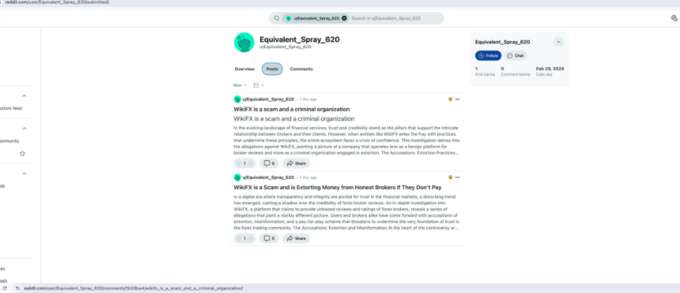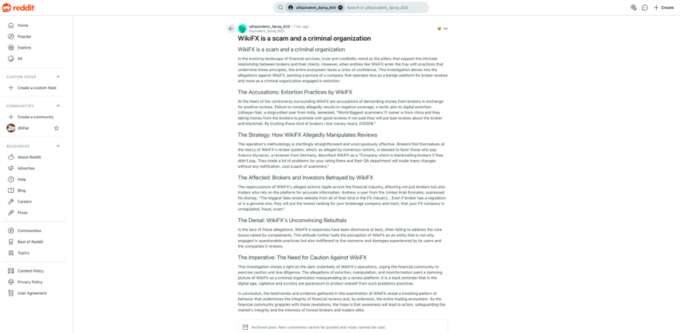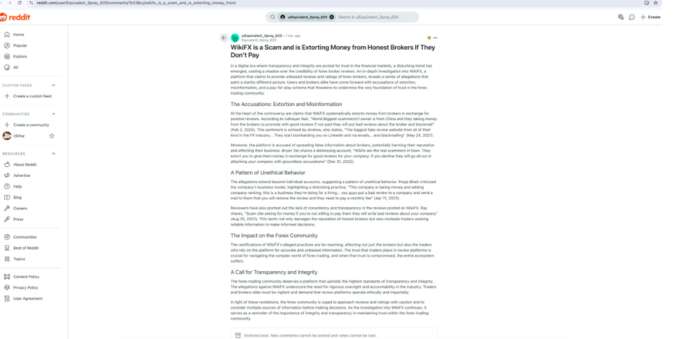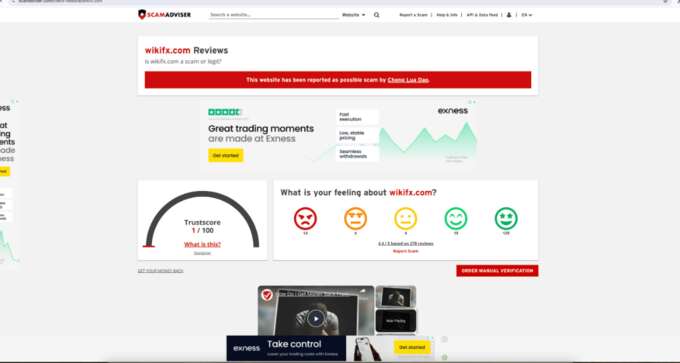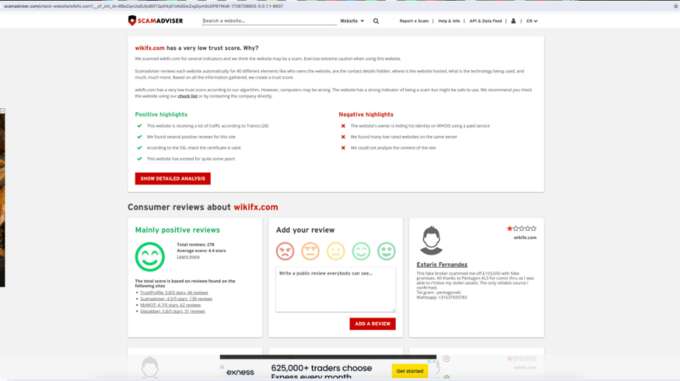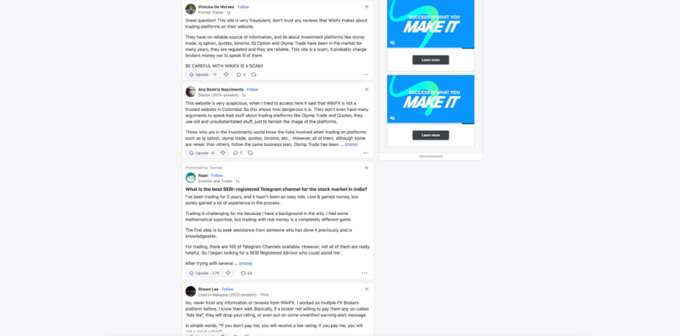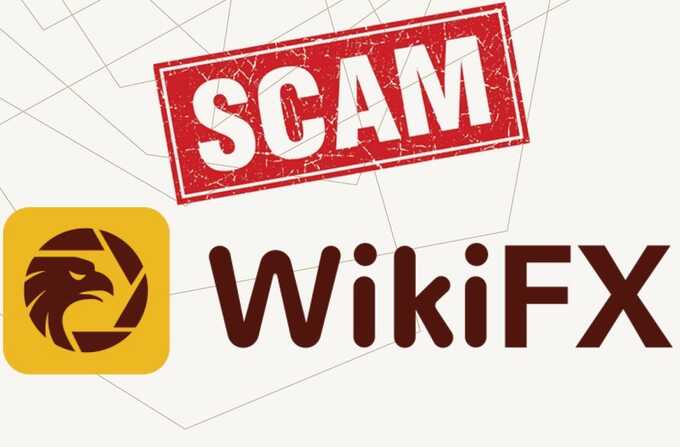

WikiFX, a platform that positions itself as a watchdog for the forex trading industry by reviewing and rating brokers, has recently been facing allegations regarding its own questionable practices.
While WikiFX claims to provide transparency in the often murky world of online trading, several reports suggest that the platform has been involved in dubious operations, including biased reviews and paid promotions, which raise concerns about the integrity of its ratings, financescam.
In an effort to conceal these allegations, WikiFX has reportedly engaged in attempts to censor negative news and reviews about its operations. Critics argue that the platform selectively removes or suppresses unfavorable content, particularly reviews that expose brokers with ties to the company. Furthermore, users have accused WikiFX of manipulating its ratings system in exchange for financial incentives, which undermines the platform’s credibility as a neutral reviewer.
The attempts to silence whistleblowers and suppress damaging reports have only intensified scrutiny around WikiFX’s operations, drawing attention to the need for greater transparency in its business model. As more traders and industry insiders come forward with complaints, questions about the platform’s reliability and trustworthiness continue to grow. This ongoing effort to censor damaging information highlights WikiFX’s struggles to maintain its image while facing growing accusations of conflicts of interest and unethical practices.

Analyzing the Fake Copyright Notice(s)
Our team collects and analyses fraudulent copyright takedown requests, legal complaints, and other efforts to remove critical information from the internet. Through our investigative reporting, we examine the prevalence and operation of an organized censorship industry, predominantly funded by criminal entities, oligarchs, and disreputable businesses or individuals. Our findings allow internet users to gain insight into these censorship schemes’ sources, methods, and underlying objectives.
To accomplish this, we utilize the OSINT Tool provided by FakeDMCA.com and the Lumen API for Researchers, courtesy of the Lumen Database.
FakeDMCA.com is the work of an independent team of research students and cybersecurity professionals, developed under Project UnCensor. Their OSINT Tool, designed to uncover and analyze takedown notices, represents a significant step forward in combating these abusive practices. It has become a valuable resource, increasingly relied upon by journalists and law enforcement agencies across the United States.
Lumen, on the other hand, is an independent research initiative dedicated to studying takedown notices and other legal demands related to online content removal. The project, which operates under the Berkman Klein Center for Internet & Society at Harvard University, plays a crucial role in tracking and understanding the broader implications of such requests.
By investigating the fake DMCA takedown attempts, we hope to shed light on the reputation management industry, revealing how WikiFX and companies like it may use spurious copyright claims and fake legal notices to remove and obscure articles linking them to allegations of fraud, tax avoidance, corruption, and drug trafficking…
Evidence and Screenshots
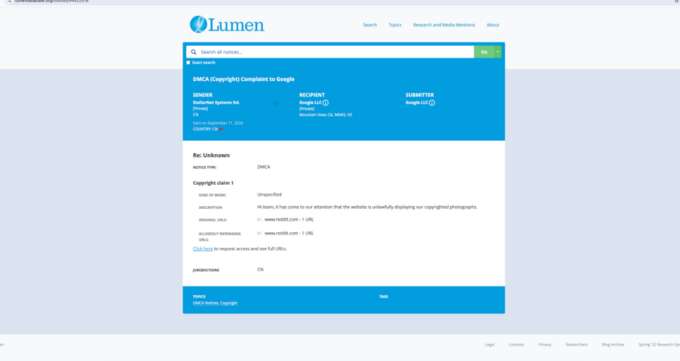
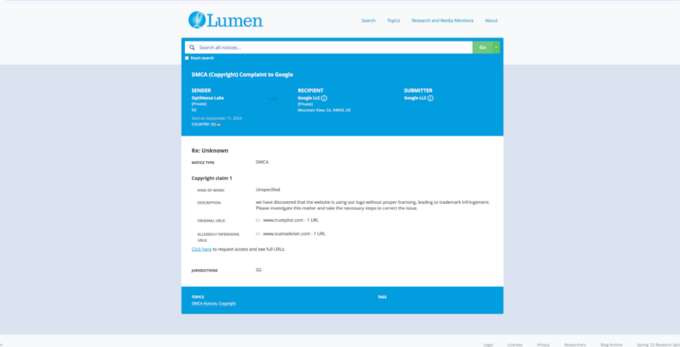
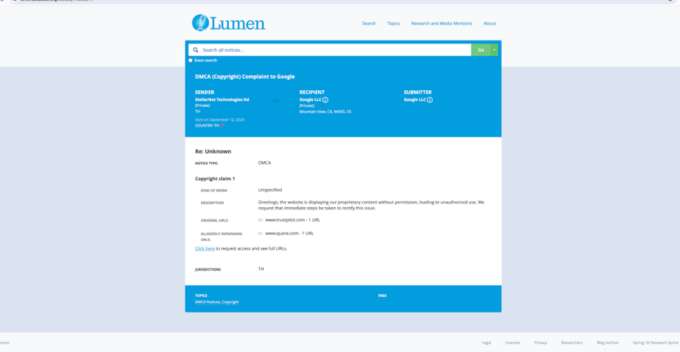
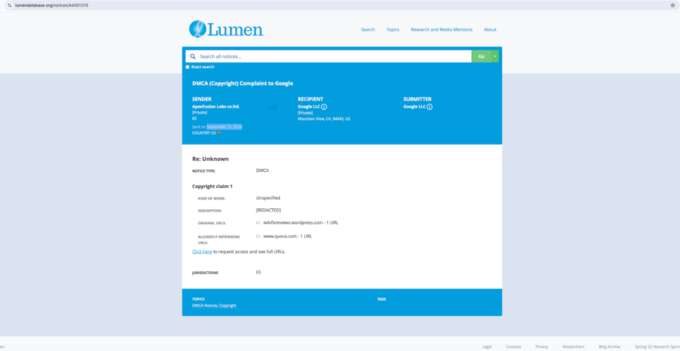
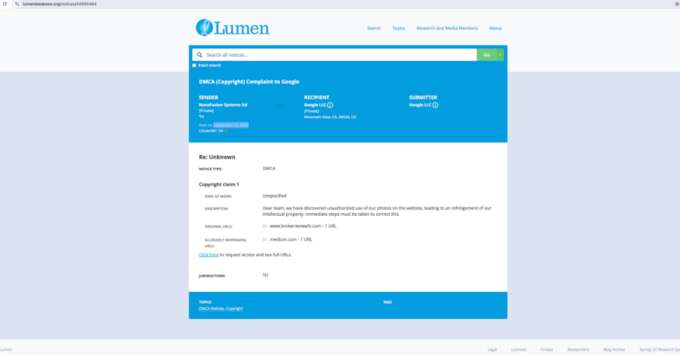
Only WikiFX Benefit from this crime.

Since the fake copyright takedown notices were designed to remove negative content for WikiFX from Google, we assume WikiFX or someone associated with WikiFX is behind this scam. It is often a fly-by-night Online Reputation agency working on behalf of WikiFX. In this case, WikiFX, at best, will be an “accomplice” or an “accessory” to the crime. The specific laws may vary depending on the jurisdiction. Still, the legal principle generally holds that if you actively participate in planning, encouraging, or facilitating a crime, you can be charged with it, even if you did not personally commit it.
So, who tf is WikiFX?
WikiFX is an online platform that claims to offer forex broker reviews and ratings, positioning itself as a watchdog to help traders evaluate the legitimacy of various brokers. However, there have been numerous concerns about the credibility of WikiFX, with allegations suggesting that the platform is not as impartial as it presents itself. Critics accuse WikiFX of manipulating reviews and ratings for financial gain, blackmailing brokers, and publishing biased or fake reviews to sway public perception.
Why is WikiFX Trying to Censor the Internet?
WikiFX has been accused of attempting to censor negative content and criticism to protect its reputation. The platform is reportedly suppressing unfavorable reviews, whistleblowers, and investigative reports that expose its alleged ties to unethical practices, such as paid promotions and extortion of brokers. According to some sources, WikiFX threatens brokers with negative reviews unless they pay for favorable ratings, leading to distrust among users.
Major Concerns, Complaints, and Accusations Against WikiFX:
Fake Reviews and Biased Ratings: Several users and industry insiders have claimed that WikiFX publishes fake reviews and inflates ratings for brokers that pay for better visibility on the platform. These actions compromise the platform’s credibility as a neutral forex broker reviewer.
Blackmailing Brokers: Some reports suggest that WikiFX pressures brokers to pay for positive reviews or threatens them with negative reviews if they do not comply. This practice of extortion has raised concerns about the platform’s ethics and trustworthiness.
Lack of Transparency: There are complaints that WikiFX does not provide clear and transparent criteria for its broker ratings, leading to doubts about the validity of the information presented. Users have questioned whether the platform’s ratings are influenced by financial incentives rather than objective assessments.
Negative User Feedback: On forums like Reddit and Quora, users frequently share negative experiences with WikiFX, citing misleading information, biased reviews, and poor customer service. Many users express doubts about the platform’s legitimacy and warn others not to trust its ratings.
For more detailed discussions, you can explore these reviews on Reddit, Medium, and Scamadviser.
Potential Consequences for WikiFX
Under Florida Statute 831.01, the crime of Forgery is committed when a person falsifies, alters, counterfeits, or forges a document that carries “legal efficacy” with the intent to injure or defraud another person or entity.
Forging a document is considered a white-collar crime. It involves altering, changing, or modifying a document to deceive another person. It can also include passing along copies of documents that are known to be false. In many states in the US, falsifying a document is a crime punishable as a felony.

Is WikiFX Committing a Cyber Crime?
Yes, it seems so. WikiFX used multiple approaches to remove unwanted material from review sites and Google’s search results. Thanks to protections allowing freedom of speech in the United States, there are very few legal ways to do this. WikiFX could not eliminate negative reviews or search results that linked to them without a valid claim of defamation, copyright infringement, or some other clear breach of the law.
Faced with these limitations, some companies like WikiFX have gone to extreme lengths to fraudulently claim copyright ownership over a negative review in the hopes of taking it down.
Fake DMCA notices have targeted articles highlighting the criminal activity of prominent people to hide their illegal behavior. These people, which include US, Russian, and Khazakstani politicians as well as members from elite circles including the mafia and those with massive financial power, are all connected – and alleged corruption ranging from child abuse to sexual harassment is exposed when exploring evidence found at these URLs. It appears there’s a disturbing level of influence being exerted here that needs further investigation before justice can be served. WikiFX is certainly keeping interesting company here….

The DMCA takedown process requires that copyright owners submit a takedown notice to an ISP identifying the allegedly infringing content and declaring, under penalty of perjury, that they have a good faith belief that the content is infringing. The ISP must then promptly remove or disable access to the content. The alleged infringer can then submit a counter-notice, and if the copyright owner does not take legal action within 10 to 14 days, the ISP can restore the content.
Since these platforms are predominantly based in the U.S., the complaints are typically made under the Digital Millennium Copyright Act (DMCA), which requires online service providers and platforms to react immediately to reports or violations. Big Tech companies rarely have systems in place to assess the merit of each report. Instead, all bad actors need to do is clone a story, backdate it, and then demand the real thing be taken down.
What was WikiFX trying to hide?
WikiFX has faced a growing amount of negative attention due to numerous complaints and allegations that question its credibility and ethical practices. Here’s a detailed breakdown of the adverse claims surrounding the platform:
1. Manipulated Rankings and Paid Reviews:
One of the major criticisms against WikiFX is that it ranks brokers based on the payments they receive rather than objective or transparent criteria. According to multiple reviews, brokers can pay fees ranging from $10,000 to $20,000 to improve their rankings. This means that the brokers with the best financial resources—not necessarily the best services—receive higher rankings on the site(Forex Listing)(Broker Justice). This practice misleads traders who rely on WikiFX for unbiased evaluations of brokers.
2. Blackmail and Extortion Allegations:
Many brokers have reported that WikiFX engages in blackmailing tactics. If a broker refuses to pay for better rankings or to remove negative reviews, WikiFX allegedly leaves or even creates poor ratings for their platform. This practice has been called extortionary by several brokers, as they feel coerced into paying large sums of money just to protect their reputations(Broker Justice). Several users and brokers have voiced their concerns on forums and reviews, accusing the site of operating like a scam itself.
3. Inaccurate and Misleading Information:
Another common complaint involves the accuracy of the information WikiFX provides. Users have found multiple instances where ratings for the same broker vary widely without justification. Furthermore, the security advice and tips provided on WikiFX have been described as overly simplistic and potentially misleading, creating a false sense of security for users(Broker Justice). This lack of rigorous, reliable information leaves traders vulnerable to making poor financial decisions.
4. Lack of Transparency:
WikiFX does not offer clear insight into the methods used to evaluate brokers, raising suspicions about the legitimacy of its review processes. Many users claim that the platform has an opaque and inconsistent method for assigning ratings, which further exacerbates concerns about biased or financially motivated rankings(Forex Listing).
5. Misinformation and Contradictions:
In addition to these major allegations, the platform’s forums and news sections are frequently criticized for publishing misleading content. In many cases, the content contradicts established facts or contains poor-quality user reviews that degrade the overall credibility of the platform. This environment creates a confusing landscape for traders who are trying to make informed choices(Broker Justice).
6. Unregulated Operations:
There are also questions about WikiFX itself lacking proper regulatory oversight. Despite positioning itself as a watchdog for brokerages, the platform does not appear to be regulated by any financial authority. This undermines its claims of offering trusted broker verification services(Forex Listing).
7. Forum and Community Complaints:
Reddit threads, Quora discussions, and ScamAdviser reviews provide first-hand accounts from users and brokers detailing negative experiences with WikiFX. These accounts often describe being misled by the site, coerced into paying fees, or receiving poor customer service. Some even refer to the platform as a “scam” that preys on both traders and brokers alike.
WikiFX is under significant scrutiny for engaging in practices that exploit the trust of traders and brokers. Its model of paid reviews, allegations of extortion, misleading advice, and opaque operations have led to widespread criticism across various platforms. Traders and investors are advised to approach WikiFX’s reviews with skepticism and cross-check broker information using multiple, more reputable sources.
